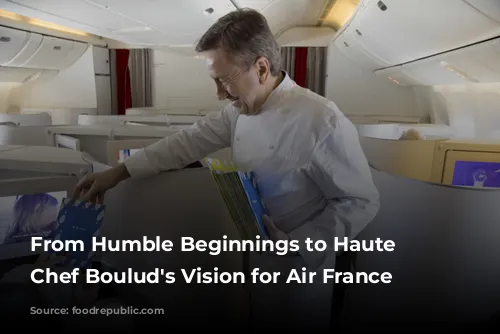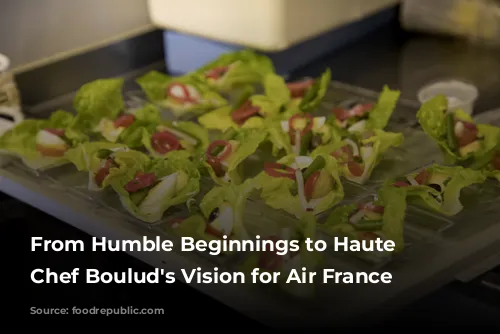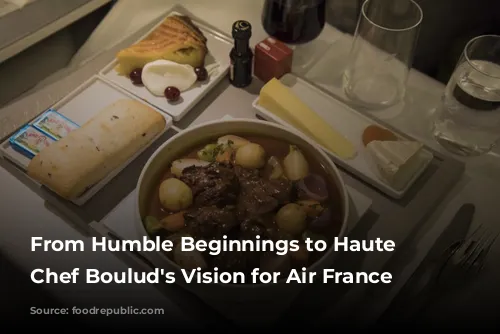The world of airline food is often associated with bland, uninspiring meals. But for Chef Daniel Boulud, the culinary experience on a flight is just as important as in any of his renowned restaurants. Boulud’s partnership with Air France, a first for a US-based chef, marks a new era for airline dining, where gourmet cuisine meets the skies.

A Taste of Excellence: Boulud’s Vision Takes Flight
Boulud’s commitment to quality is evident in every detail. A recent flight to Paris, filled with food writers, showcased the chef’s signature dishes with meticulous presentation and flavors. Lobster and lamb chops, salty cultured butter on warm mini-baguettes, and a dense vanilla bean custard tart – a specialty of his native Lyon – were just some of the culinary delights that awaited passengers. A generous splash of Port added a touch of luxury to the experience. The contrast between Boulud’s offerings and the usual airline fare was stark.

Elevating Airline Food: An Interview with Chef Boulud
Boulud’s passion for culinary excellence extends to the skies. In an interview, he reveals his philosophy behind transforming airline food into a memorable experience.
“My first memory of good airplane food was on a flight to Copenhagen, about 30 years ago,” says Boulud. “Scandinavian Airlines served herring and a meatball dish – frikadeller with sweet cabbage. It was delicious and different.” He also fondly recalls a flight from Hong Kong to Bali, where he savored nasi goreng with shrimp and chicken – a dish that could be reheated and still retain its flavor.
Boulud emphasizes the importance of using ingredients that hold up well to reheating. He also notes that even in the era of private jets, where chefs are often on hand to prepare meals, the quality of airline food should never be compromised.

Reclaiming the Glamour of Air Travel: A Journey Through Time
Boulud reflects on the nostalgic era of airline dining, when first-class passengers were treated to elaborate meals.
“I’ve seen old advertisements for Pan Am and British Airways, where they’d roll out a prime rib or stuffed turkey and carve it in front of you,” he says. “Flight attendants were experienced servers, just like in restaurants.”
Boulud acknowledges the evolution of air travel. “First class still offers a glimpse of that era, but there are fewer seats now. Everyone travels business class, and flights are faster. People have other sources of entertainment on board. In the past, the meal was the main form of entertainment, and passengers looked forward to a special dining experience.“
Boulud believes that while efficiency is paramount, the focus on good service and food should remain. “The era of the roast might be gone, but good food and service are still essential.“

The Art of Airline Cuisine: Balancing Flavors and Smells
Boulud highlights the unique challenges of preparing food for air travel, where considerations like smell and texture come into play.
“Pre-sliced charcuterie can dry out quickly,” he explains. “But something like chicken liver mousse, served in little pots with a proper seal, would be perfect.” He also believes that while foie gras is a classic, it’s not necessary to serve such elaborate dishes on a plane. “A good chicken liver mousse could be just as flavorful and more approachable.“
When it comes to cheese, Boulud prefers firm varieties that can withstand the air travel environment. “Runny or smelly cheeses like Époisses are best avoided, as the smell can travel throughout the cabin.” He also expresses his dislike for pre-packaged “cheese whiz.”
Boulud underscores the importance of considering the olfactory impact of food on board. “We try to create dishes that are fragrant but not overpowering,” he says. “For example, a Moroccan tagine with saffron, cumin, cinnamon, and coriander can be flavorful without being too intense.“
He also notes the limitations of using certain ingredients, particularly those with strong smells, like mutton or offal. “It’s about finding a balance between flavor and aroma, and respecting the unique environment of air travel.“

A New Era of Airline Cuisine: A Partnership for Excellence
Boulud’s partnership with Air France represents a commitment to elevate airline food to a new level.
“Air France has been collaborating with chefs for decades,” he says. “They have a state-of-the-art safety program, research and development departments, and architects working to ensure the highest standards.” He believes that investing in food quality is key to customer satisfaction and loyalty.
Boulud emphasizes the importance of cultural exchange in culinary partnerships. “Having relationships with American chefs is essential for Air France, as they expand their service to destinations across the US.“
With Boulud’s vision and Air France’s commitment to excellence, the future of airline food is bright.









